|
Black Tuesday: January 17, 2006. That was
yesterday. It is now about 2:00 in the morning on January
18th, about seventeen hours since I learned the news that
the American Winchester lever actions have been dropped
from production. The great old Model 94, along with the Model
70 bolt action; a true legend in its own right, and the Model
1300 pump shotgun, have been issued a death warrant.
Operations at the New Haven, Connecticut United States
Repeating Arms Company (USRAC) will cease operations on
March 31, 2006. To me, this is sad news.
This is not the first time that the Model 94 has
been pronounced dead. Although it has been in almost continuous
production for 112 years, right now things donít look so good
for the dandy little levergun. USRAC has been producing the
Model 94 Winchester since about 1981, and the quality has
been very good. It has suffered a few unwelcome changes in those
years, beginning with the crossbolt safety, which had recently
been changed to a much better top tang safety. The Angle Eject
action was seen as an improvement by some, and as a fault by
others. Still, it was a very good lever action carbine. In the
last couple of years, some great variations of the 94 had been
introduced, from pistol-caliber carbines aimed toward the Cowboy
Action market to some beautiful rifles such as the Legacy,
it looked as if the Model 94 was becoming better than
ever.
Perhaps we levergun fans are living in a bubble.
There was a time when the Model 94 was the epitome of a deer
rifle, at least around here. Back in the 1970s, when I was a
teenager, if you wanted a deer rifle, you went to the Western
Auto or other similar store and bought a new Model 94 for
about one hundred bucks. If you were really well-heeled, you
went to Riley Hardware in Clarksville and bought a new Remington
BDL bolt gun or a 742 automatic, but the majority bought a good
old 94, chambered for the .30-30
Winchester, and it worked just fine. Living in that
bubble, it seems that that is the way that things should
continue. However, save for the Cowboy Action crowd,
levergunners are a dying breed.
The fact is, a new hunter these days can go to
the local Wal-Mart or other huge store and buy a new Stevens
bolt action .30-06, a scope, mounts, sling, hunting
license, and lunch for less money than a new Winchester
levergun. He will have a flatter shooting, harder hitting,
and probably more accurate rifle. Why should he even consider a
lever action? I canít answer that for him, at least not in a
way that he could understand.
Just as most shooters prefer auto pistols to
sixguns, riflemen are moving away from the levergun to
autoloaders and bolt guns. Most lever gunners also like single
action revolvers. They just go together. However, one of the
largest Ruger distributors tells me that for every
Blackhawk sold, they will sell fifty or more P95 autoloaders.
The same trend holds true for the levergun. If it were not for
the Cowboy Action shooters, I suspect that Marlin would
also be struggling with slow levergun sales. A large piece
of the levergun market thrives on nostalgia. It shouldnít
really be that way, but it is.
I will admit, as will most levergunners, that
hunting with, or just casual plinking with, a levergun is at
least partly due to the guns' connection with the past.
The name Winchester to most conjures up thoughts of the Old
West, even though as many or more of the rifles are used in the
South and East for hunting whitetail in the deep woods. Still,
visions of sitting around the campfire under the stars, the
smell of wood smoke, coffee, and dust in air, with cattle
grazing just over the hillside drift through the minds of most
lever gunners. We are the ones who go to the show see a
new western movie when they sparsely appear at the theater.
Levergunners and sixgunners are the folks that would much rather
watch a Gunsmoke rerun than Dr. Phil on the TV. We
prefer John Wayne to Brad Pitt and Maureen
OíHara to J-Lo. We like regular coffee instead of a
soy latte. If we wear a cap, it is pointed in the
direction that we are facing. If you are a lady, we are the men
who open your door. If we shave, we shave clean; if we
donít it is a real beard, not just three days' growth.
We like our guns made from walnut and blued steel, and we like
our Winchesters to be made in America.
Over the past few years, there have been a few
limited production Winchesters that are produced in Japan, such
as the Models 95, 1885, and 92. These Japanese Winchesters are
of the highest quality, with a fit and finish better than any
Winchesters of recent manufacture. They are, however, relatively
expensive. We levergunners ogle these limited edition rifles
with lust in our hearts, but few of us can purchase them in
quantity. Even if we could, there are those of us who, and
I am in that group also, want our Winchesters to read: Made in
the USA on the barrel. I own a couple of Japanese Winchesters,
and they are fine rifles, but I still wish that they were built
in Connecticut. I suppose that I really should not care, but I
do. It would be like Harley-Davidson making their
motorcycles in Japan. They would be good machines, but I prefer
mine to be made in Milwaukee by beer-drinking, tattooed,
overweight Americans. Itís just supposed to be that way.
The same with Winchesters. I like mine
American made. However, the decision to cease production of
products that are not making a profit is understandable. It is a
sign of the times. FN Herstal, which owns USRAC, is under
no obligation to produce rifles that are not profitable. Why
should they? They will produce what shooters will buy, and most
shooters are interested in other rifles. The day before the SHOT
Show in 2005, Winchester had reserved a shooting range
near Las Vegas for writers to try out their new products. There
were about twenty shooting stations, each with new rifles and
cases of ammunition. Every station except for one had a new bolt
action, mostly ones chambered for the latest short magnums. One
station down near the right side of the range had a new Legacy
Model 94 levergun chambered for the .30-30 Winchester
cartridge. It was mostly ignored. I was the only writer I know
of who shot that levergun all morning. I am sure that someone
else must have fired the gun, but most were flocked around the
new short magnums. That was fine with me, as I had all the time
that I wanted to plink away at a 300 yard gong with the
levergun, shooting as much free ammo as I desired. Still, it
rather surprised me that more interest wasnít shown the new
Legacy rifle.
Perhaps I should have seen it coming, but the
news of the death of the Model 94 took me by surprise.
However, its swan song has been played before, with its epitaph
all but written, and it has always came back from the grave. The
94 is just too good a design to die, and hopefully it has just
suffered a stroke instead of a cold death. Hopefully,
someone will secure the name of Winchester to be placed on a new
Model 94. Hopefully, the rifles will be better than ever, and be
built in the USA. There is always hope.
Nostalgia aside, the Model 94 Winchester is
really a great design, brought forth from the genius of John
Browning over a century ago. The guns are light, handy,
powerful, and plenty accurate. It is the gun that is Winchester.
It is the rifle that is America. If we lose the Winchester Model
94, we have lost a piece of ourselves. If you are not a lever
gunner, that sounds like foolishness I am sure; but if you are,
you will understand what I mean.
Jeff Quinn
  
Got something to say about this article? Want to agree (or
disagree) with it? Click the following link to go to the GUNBlast Feedback Page.
|
|
Click pictures for a larger version.

As a lifelong fan of Winchester lever-actions, Jeff was
saddened by the news of the Model 94's demise.
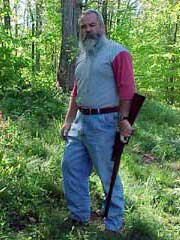
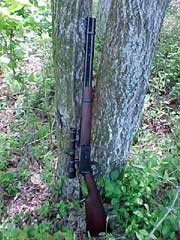
Winchester's Trails End Hunter
rifle,
chambered in .25-35.
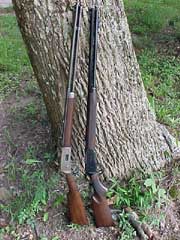
Old gun, new gun...author's vintage-1895 Winchester
Model 1894 in .30 WCF (left),
Legacy Model 94 in .38-55
(right).
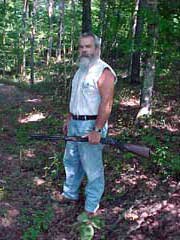
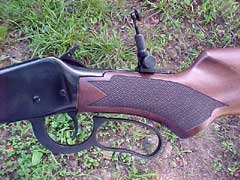
Winchester's Legacy Model 94 in
.38-55.

Winchester Model 94 Ranger Compact
.357 Magnum (left), and Model 94 20-inch carbine in
.30 WCF (right).
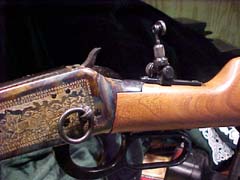
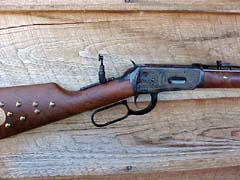
Winchester Model 1894 Chief
Crazy Horse commemorative rifle in .38-55 with Marble's tang
sight installed.
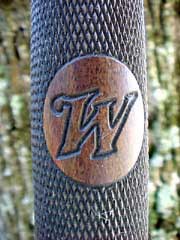
|
![]()